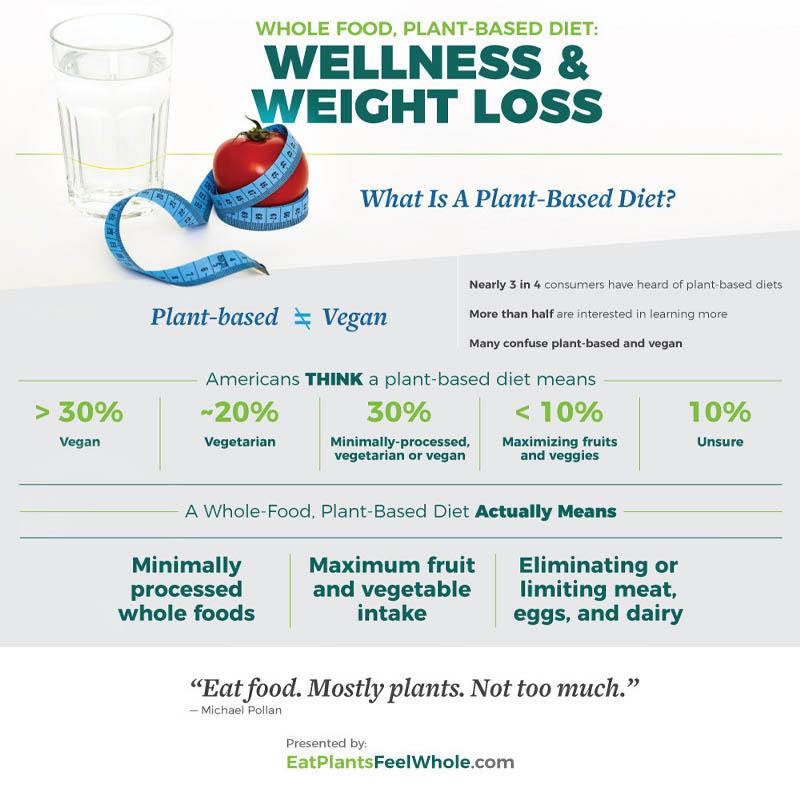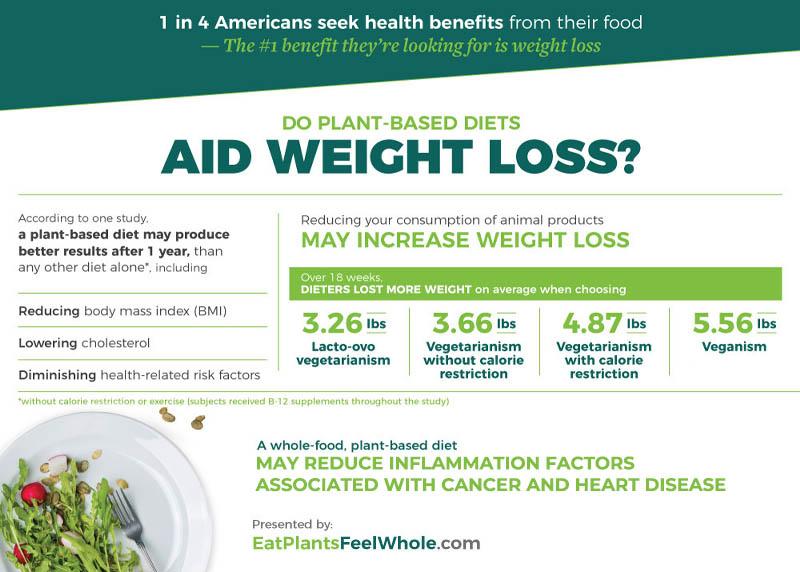
According to the U.S. Centers for Disease Control and Prevention (CDC), nearly 50 percent of Americans are trying to lose weight at any given time. That’s not surprising given that 70 percent of us are overweight and carrying excess body fat.
Eating more vegetables and fruits is one of the top strategies for losing weight. Eating whole, minimally processed plant foods can promote satiety (feeling full and satisfied) and support your weight-loss efforts.
What Is a Whole-Food, Plant-Based Diet?
The term “plant-based diet” describes any eating styles that include mostly foods of plant origin, including beans, lentils, and peas as well as fruits, herbs, and spices. It contains olive oil and other plant oils, vegetables, and whole grains.
When following this eating style, plant foods should be whole and minimally processed — this means as close to their original form as possible. For example, you should choose a whole apple instead of apple juice, or nuts instead of nut butter with added salt and sugar.
It’s also important to note that whole foods contain fewer preservatives and artificial ingredients. So, you should be able to recognize all the ingredients on the package. In many cases, your plant-based food selections should be fresh produce — which won’t have any label at all.
Losing Weight With Plant Power
Research shows that plant-based diets may be the best route for weight loss. One study found that participants who followed a plant-based diet for one year without restricting calories reduced their body mass index (BMI), cholesterol, and other health risk factors.

Another study found that compared to other diets, eating a diet composed only of plant foods produced the most significant weight loss over 18 weeks compared to other forms of plant-based eating.
Feeling Full and Satisfied With Plants
Whole plant foods tend to have more vitamins, minerals, protein, and fiber than processed foods. Plants are also generally low in energy density, a measure of calories compared to the volume of food. Simply put, they’re low in calories but take up a lot of space. For example, apples, leafy greens, broccoli, cooked oats, and carrots are all whole plant foods. They take up a lot of space, are low in calories, and take a while to eat.
Whole plant foods also contain complex carbohydrates that are digested slowly, have fiber, provide lasting energy throughout the day, and help prevent blood sugar and insulin spikes.
Start Your Meal With Vegetables
The order of food eaten at a meal may impact how much is eaten. Studies show that starting the meal with high-fiber, non-starchy vegetables like a salad or broth-based vegetable soup can help you eat less overall.
Similarly, starting a meal with a high-fiber whole fruit such as an apple can also help reduce portions at mealtime. One study showed that starting a meal with an apple reduced total calorie intake at mealtime by 15 percent, while consuming applesauce or apple juice at the beginning of a meal did not produce the same results.

High-fiber, low-calorie foods like whole vegetables and fruits take up space in the stomach, slow down how quickly we eat, and set off satiety signals that let the brain know it’s time to stop eating.
Health Benefits Beyond Weight Loss
Research shows that plant-based diets help with weight loss and lower blood sugar, blood pressure, and cholesterol, as well as reduce the risk for chronic health conditions like cognitive decline, cancer, heart disease, and type 2 diabetes.
To reap the benefits of a plant-based diet, you don’t necessarily need to eat exclusively plant-based foods. You can consume animal foods as an occasional protein or garnish to a plant-based meal. Consider small amounts of cheese, wild-caught fish, and eggs. Just remember that plants should take up most of your plate.
Small Changes for Lasting Weight Loss
Small changes make the shift toward whole foods and plant-based eating more realistic. Small changes with a significant impact include choosing brown rice instead of white rice, popcorn instead of pretzels, salad to start a meal, and whole fruit instead of fruit juice.
With a few changes each week, you’ll be eating a whole-food, plant-based diet without feeling deprived.
The original version of this post appeared on the AdventHealth Blog.